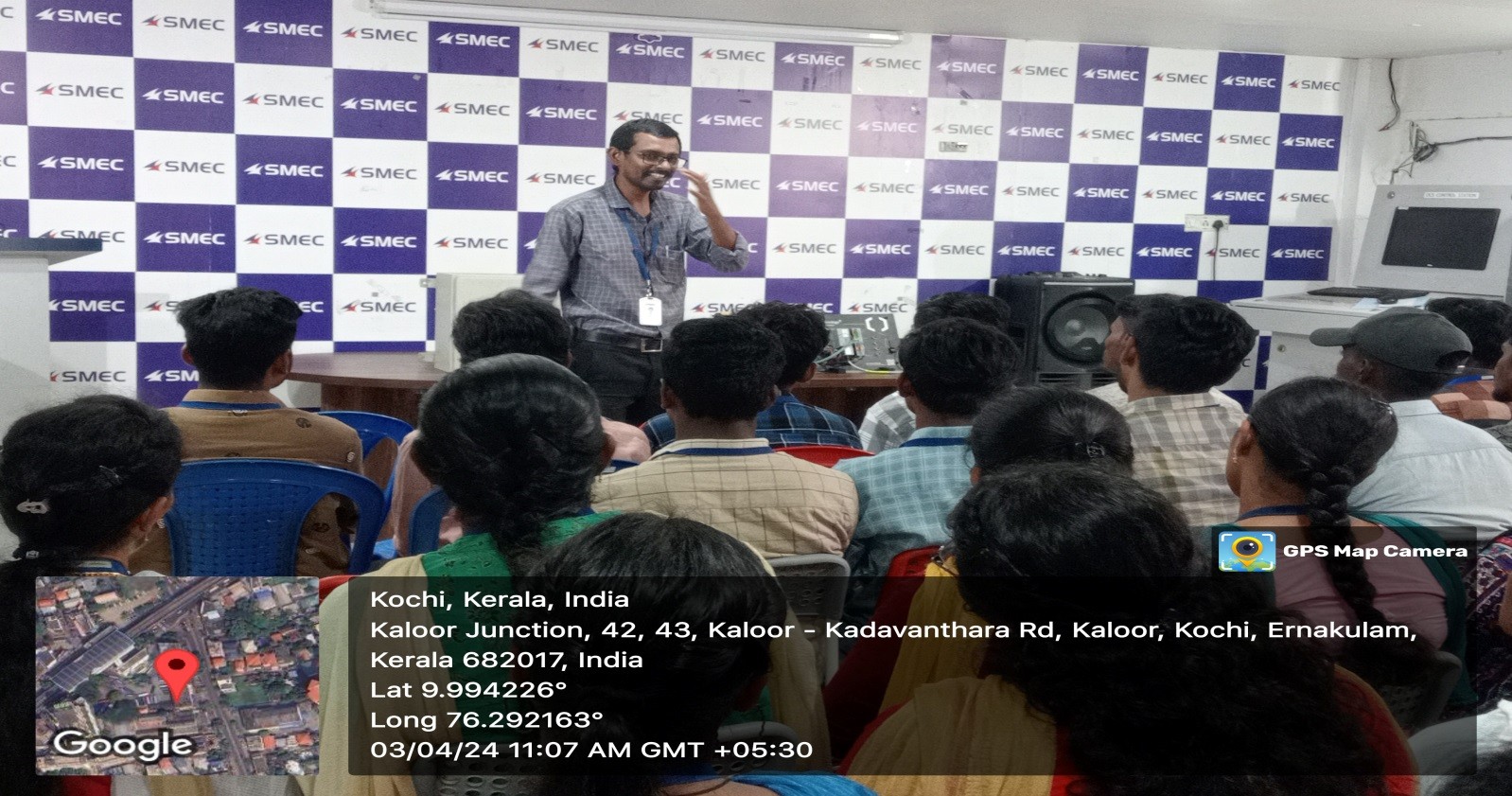The Department of Artificial Intelligence and Data Science, established in 2020, is dedicated to shaping the future of intelligent systems and data-driven technologies. Our department focuses on cutting-edge research, innovation, and industry-oriented education in AI, machine learning, big data analytics, and related fields.
With a team of highly qualified faculty and state-of-the-art facilities, we aim to empower students with the knowledge and skills required to solve real-world challenges using AI and data science. Our curriculum integrates theoretical foundations with hands-on experience through labs, industry collaborations, and research projects.
We are committed to fostering a culture of innovation, ethical AI practices, and interdisciplinary learning, preparing students for successful careers in academia, research, and industry.
To be a Centre of Artificial Intelligence and Data Science by imparting quality education, promoting research and innovation with global relevance.
| S.No | Name of the Faculty | Qualification (With Specilisation) | Designation |
|---|---|---|---|
| 1 | Gayathri J | B.E, M.E, (Ph.D) | Assistant Professor |
| 2 | Jeeva A | B.Sc., M.C.A, M.E, (Ph.D) | Assistant Professor |
| 3 | Sundaram D | B.E, M.Tech | Assistant Professor |
| 4 | Vinopriya K | B.E, M.E | Assistant Professor |
| 5 | Praveena M | B.E, M.E | Assistant Professor |
| 6 | Ramya B | B.E, M.E | Assistant Professor |
| 7 | Velvizhi L | B.Sc., M.C.A, M.E | Assistant Professor |
| 8 | Sinthiya A | B.E, M.E | Assistant Professor |
| 9 | Aarthi P | B.E, M.Tech | Assistant Professor |
| 10 | Praveen K | B.E, M.E | Assistant Professor |
| 11 | Ramya V | B.E, M.E | Assistant Professor |
| 12 | Natarasurasa M | B.Tech, M.E | Assistant Professor |
| 13 | Kalaivani D | B.E, M.E | Assistant Professor |
| 14 | Sreeraj G | B.E, M.E | Assistant Professor |
| 15 | Savitha N | B.E, M.E | Assistant Professor |
| 16 | Kalaiyarasan S | B.E, M.E | Assistant Professor |
| 17 | Kasivishvanathan S | B.E, M.E | Assistant Professor |
| 18 | Nethra Devi K | B.E, M.E, (Ph.D) | Assistant Professor |
| S.No | Category | Members |
|---|---|---|
| 1 | Chairperson (1 Member) Head of the Department concerned |
Dr.R.Umamaheswari Head of the Department/CSE |
| 2 | All Faculties Faculty members of the Department |
Faculty Members of the Department |
| 3 | Subject Experts (2 Members) From outside the parent University Nominated by the Academic Council |
Dr.P.Kuppusamy Associate Professor Grade II, School of Computer Science and Engineering, VIT – AP University, Andhra Pradesh Cell: 9843016837 Email: drpkscse@gmail.com Dr.N.Jaisankar Professor, School of Computer Science and Engineering, VIT, Vellore – 632 014 Cell: 9443099717 Email: njaisankar@vit.ac.in |
| 4 | University Nominee (1 Member) Nominated by the Vice-Chancellor |
Dr.B.Vinothkumar Professor, Department of Information Technology, PSG College of Technology, Peelamedu, Coimbatore – 641 004 Cell: +91 95007 21416 Email: bvk.it@psgtech.ac.in |
| 5 | Representative from industry/corporate sector/allied areas (1 Member) Nominated by the Principal |
Ms.Sivajothi Velayudham Quality Leader, Emergere Technologies LLC, Pelamedu, Coimbatore Cell: 8870544668 Email: jothihcl@gmail.com |
| 6 | College Alumni (1 Member) Nominated by the Principal |
Mr.S.Loganathan Senior Consultant, HCL Technologies, Chennai Cell: 9940409845 Email: logumca2011@gmail.com |
| 7 | Experts (1 Industrial Expert + 1 Academic Expert) |
Dr.B.Ezhilavan CEO and Managing Director, VEI Technologies Private Ltd, Chennai Cell: 9003785766 Email: info@vei.technologies.com Dr.K.Sakthivel Professor, Computer Science and Engineering, K.S. Rangasamy College of Technology, Thiruchengode – 637 215 Cell: 8842166425 Email: k_sakthivel72@yahoo.com |
https://drive.google.com/file/d/1JfrwgklEi1Di8-FgqNfX3PuFwUgLXMei/view?usp=drive_link
https://drive.google.com/file/d/1rWjOPy6ywyXUAWJ_BeFlR9i_5_B-pcKX/view?usp=drive_link
| S.NO | Course Code | Practical |
|---|---|---|
| 1 | 23GE125 | Basic Computing Laboratory |
| 2 | 23GE221 | Programming in C Laboratory |
| 3 | 23GE321 | Problem Solving and Python Programming Laboratory |
| 4 | 23AD321 | Data Structures and Algorithm Laboratory |
| 5 | 23AD421 | Artificial Intelligence and Machine Learning Laboratory |
| 6 | 23AD422 | Database Design and Management Laboratory |
| 7 | 23AD423 | Data Science and Analytics Laboratory |
| 8 | 23AD521 | Deep Learning Laboratory |
| 9 | 23AD522 | Data and Information Security Laboratory |
| 10 | 23AD621 | Mobile Applications Development Laboratory |
| 11 | 23AD622 | Data Modeling and Business Intelligence Laboratory |
| 12 | 23AD721 | Advanced AI and Robotics Laboratory |
| Description | Count |
|---|---|
| Scholars | 4 |
| Book Publications | Nil |
| Journal | 01 |
| Patent | 3 |
| S.NO | Name of the Institution/Industry/Corporate House | Month and Year of signing MoU | Duration |
|---|---|---|---|
| 1 | MoU with NoobTron FC Pvt. Ltd., Chennai. | 13.02.2023 | 5 Years |
| 2 | MoU with Live wire, Namakkal. | 22.06.2023 | 5 Years |
| 3 | Neuraai Solutions Private Limited | 13.12.2023 | 3 Years |
As a Centre of Excellence in Information Technology, we bridge the gap between academia and industry. Through close collaboration with our industry partners, we provide students with opportunities to work on real-world projects and gain invaluable experience. Our commitment to sustainable energy solutions drives our research and education, contributing to a greener future.
Gnanamani College of Technology (Autonomous), Namakkal, proudly collaborates with leading industry partners to enhance innovation, research, and skill development. This MoU aims to bridge the gap between academia and industry, providing students with hands-on experience, expert mentorship, and cutting-edge technological insights.
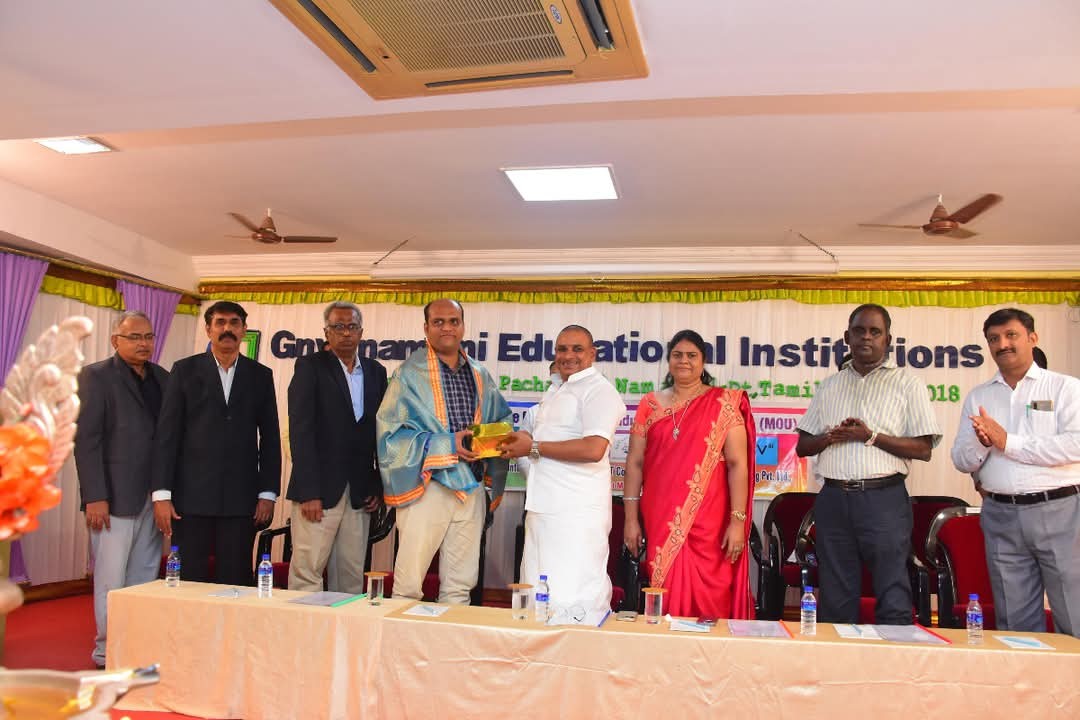
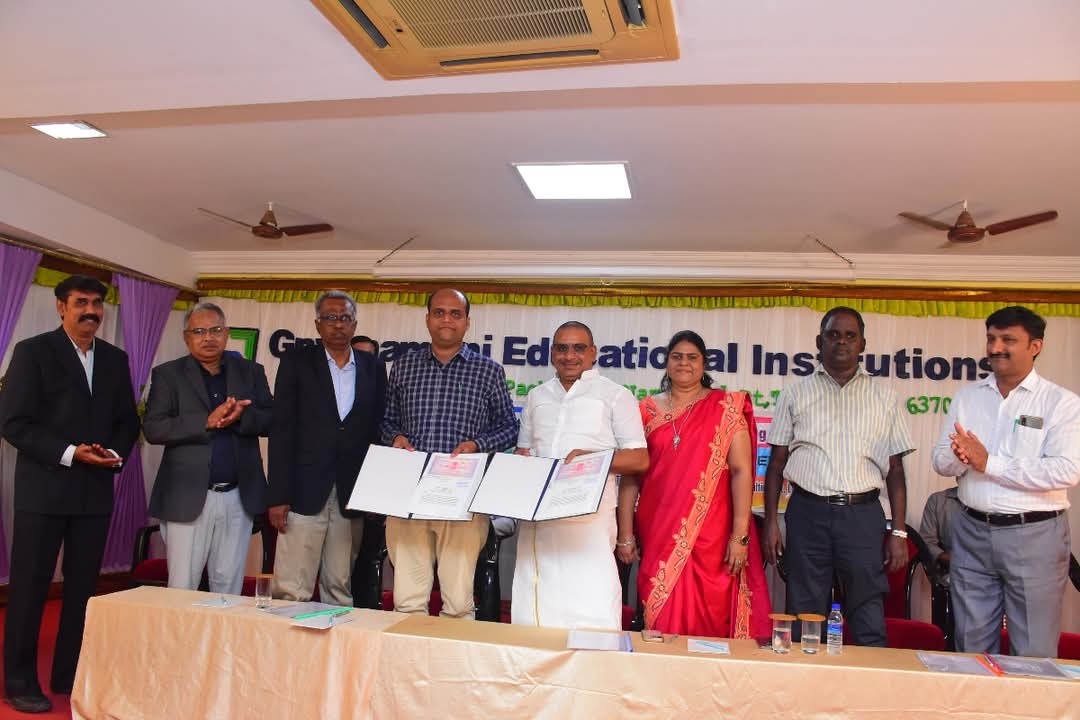
(Precision Infomatic (M) Pvt. Ltd / SAT Connections / Datareveal IT Consulting Private Limited)
| Batch | Total Strength | Placed Student Count | Percentage |
|---|---|---|---|
| 2020-2024 | 31 | 16 | 51.61 |
| S.No | Batch | Name | Designation | Company Name |
|---|---|---|---|---|
| 1 | 2018 - 2022 | Vasanth Kumar S | Associate Engineer | Enoah iSolution Private Limited |
| 2 | 2018 - 2022 | Karthickraja | Software Engineer | Jilaba Software Service Private Limited |
| 3 | 2018 - 2022 | G Janarthanan | Full Stack Software Developer | eNoah iSolution Pvt Ltd, Chennai |
| 4 | 2018 - 2022 | P Gokul | SAP Consultant | Infosys |
| 5 | 2022 - 2024 | Nandhakishore | InfoSec | PLINTRON Mobility Services |
| 6 | 2022 - 2024 | Ajay L | InfoSec | PLINTRON Mobility Services |
| S.No | Batch | Name | Designation | Company Name |
|---|---|---|---|---|
| 1 | 2020-2024 | BALASURYA S | Product Analyst | Plintron Global Services, Chennai. |
| 2 | 2020-2024 | JOSENA REEJU B | Assistant System Engineer | Tata Consultancy Services, Kochin. |

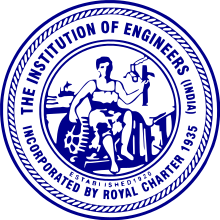
| S.No | Academic Year | Sem | Type of the Program | Name of the Program | Date | Total Students Participated | Whether the program is organized by / Professional Body (Name)/MOU Industry(name)/General |
|---|---|---|---|---|---|---|---|
| 1 | 2024-2025 | ODD | Poster Presentation | Poster Presentation of Ideas | 19.11.2024, 20.11.2024, & 21.11.2024 | 250 | Institution Innovation Council (IIC) and Entrepreneurship Development Cell (EDC) |
| 2 | 2024-2025 | ODD | National Level Technical Symposium | Gnan Whizkid-2k24 | 25.10.2024 | 175 | General |
| 3 | 2024-2025 | ODD | Seminar | Tech Driven Startups & Entrepreneurship | 27.08.2024 | 256 | Institution Innovation Council (IIC), Entrepreneurship Development Cell (EDC) and Institution of Engineers (IEI) |
| 4 | 2024-2025 | ODD | Webinar | Innovative Practices and Skill Enhancement for Students | 24.08.2024 | 84 | Alumni Talk Series |
| 5 | 2023-2024 | EVEN | Innovative Ideas | Mentoring Event on Innovative Idea Presentation | 26.02.2024 & 27.02.2024 | 82 | Professional Body |
| 6 | 2023-2024 | EVEN | Guest Lecture | Intellectual Property Rights in Engineering Life, Patent Filling Procedure and IP Management for Startup | 02.02.2024 | 65 | Professional Body |
| 7 | 2023-2024 | EVEN | Innovative Ideas | Mentoring Event on Innovative Idea Presentation | 28.05.2024 | 150 | Professional Body |
| 8 | 2023-2024 | EVEN | Innovative Ideas | Market Analysis and Opportunity Identification for Entrepreneurs | 28.05.2024 | 150 | Professional Body |
| S.NO | ACADEMIC YEAR | STUDENTS PARTICIPATION COUNT | PRIZE WINNERS |
|---|---|---|---|
| 1 | 2024-2025 | 129 | 2 |
| S.NO | ACADEMIC YEAR | STUDENTS INTERNSHIP- COUNT |
|---|---|---|
| 1 | 2024-2025 | 120 |
| S.No | Name of the value-added courses | Academic year | Number of students enrolled during the year |
|---|---|---|---|
| 1 | Website development using java script | 2023-2024 | 30 |
| S.No | ACADEMIC YEAR | FACULTY NAME | ACHIEVEMENTS |
|---|---|---|---|
| 1 | 2024-2025 | Mrs. J. Gayathri | ELITE In NPTEL |
| 2 | 2023-2024 | Mr. G. Sivakumar | ELITE SILVER IN NPTEL |
| 3 | 2023-2024 | Mr. A. Jeeva | ELITE SILVER IN NPTEL |
The Artificial Intelligence and Data Science Department Library has a collection of textbooks with hundreds of titles on a variety of topics. Library also possesses journals, magazines, project and seminar reports, lab manuals and question banks and CDs of e-journals and e-books. The collection is strong in all aspects with special strengths in programming basics. Software development, Computer architecture and Organization, Operating systems, networking and Database administrations and internet technologies.
| Particulars | Numbers |
|---|---|
| Total No. of Titles | 95 |
| Total No. of Volumes | 133 |
| Total No. of e-Journals | 24 |
| Total No. Printed Journals | 2 |
The department of Artificial Intelligence and Data Science final year students went to industrial visit to mysuru.The company name was “LEEPRA TECHNOLOGIES PVT LTD”.
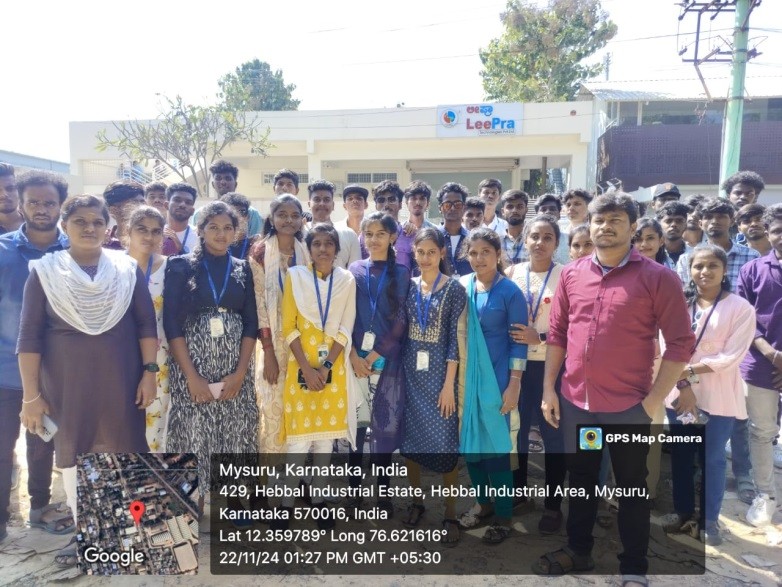
Alpha Ace Academy Pvt Ltd, Mysore
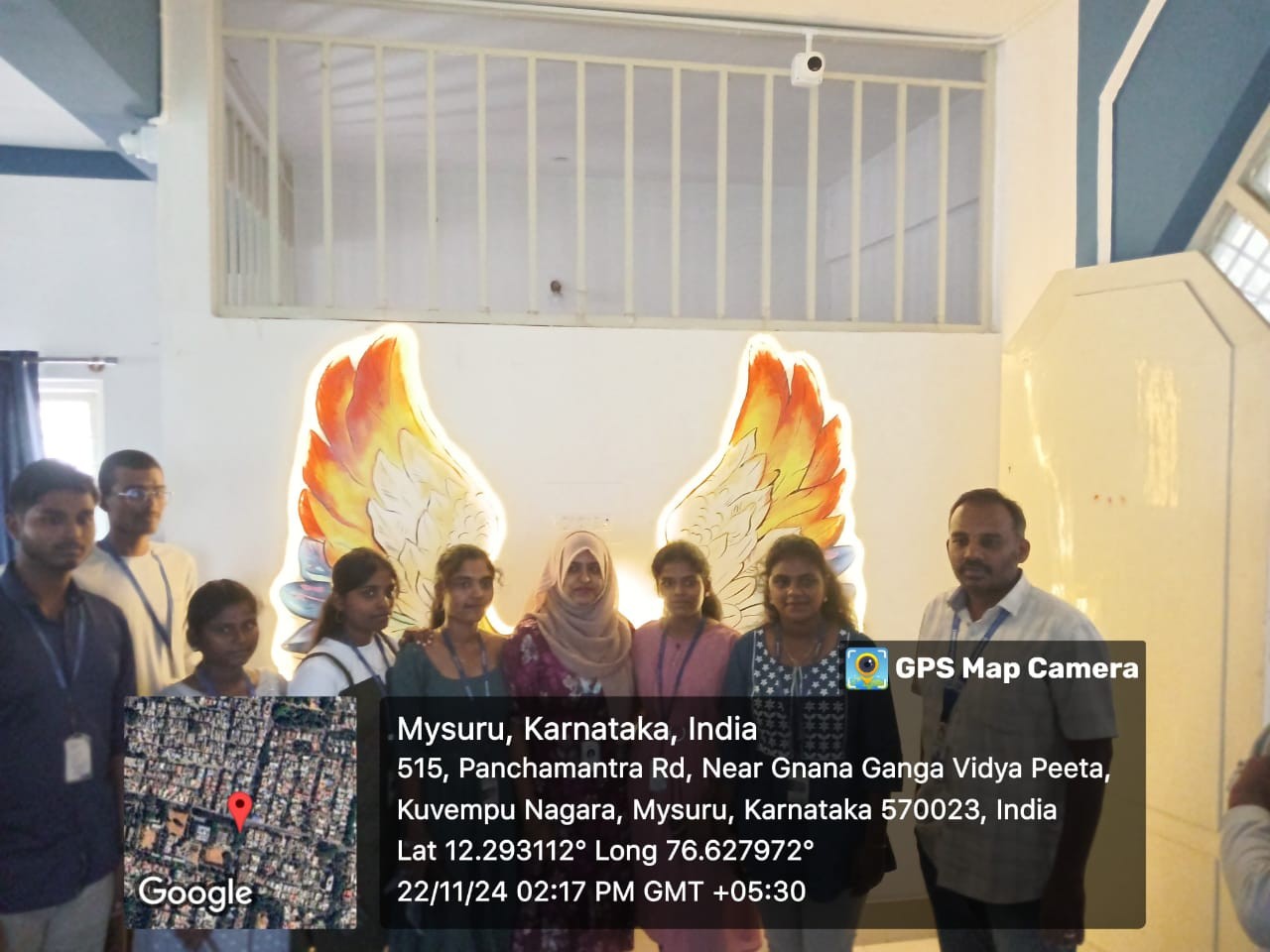
Industrial visit to company, C-DAC in Trivandrum on (27/3/2024) Centre for Development of Advanced Computing (CDAC), Thiruvananthapuram, Kerala
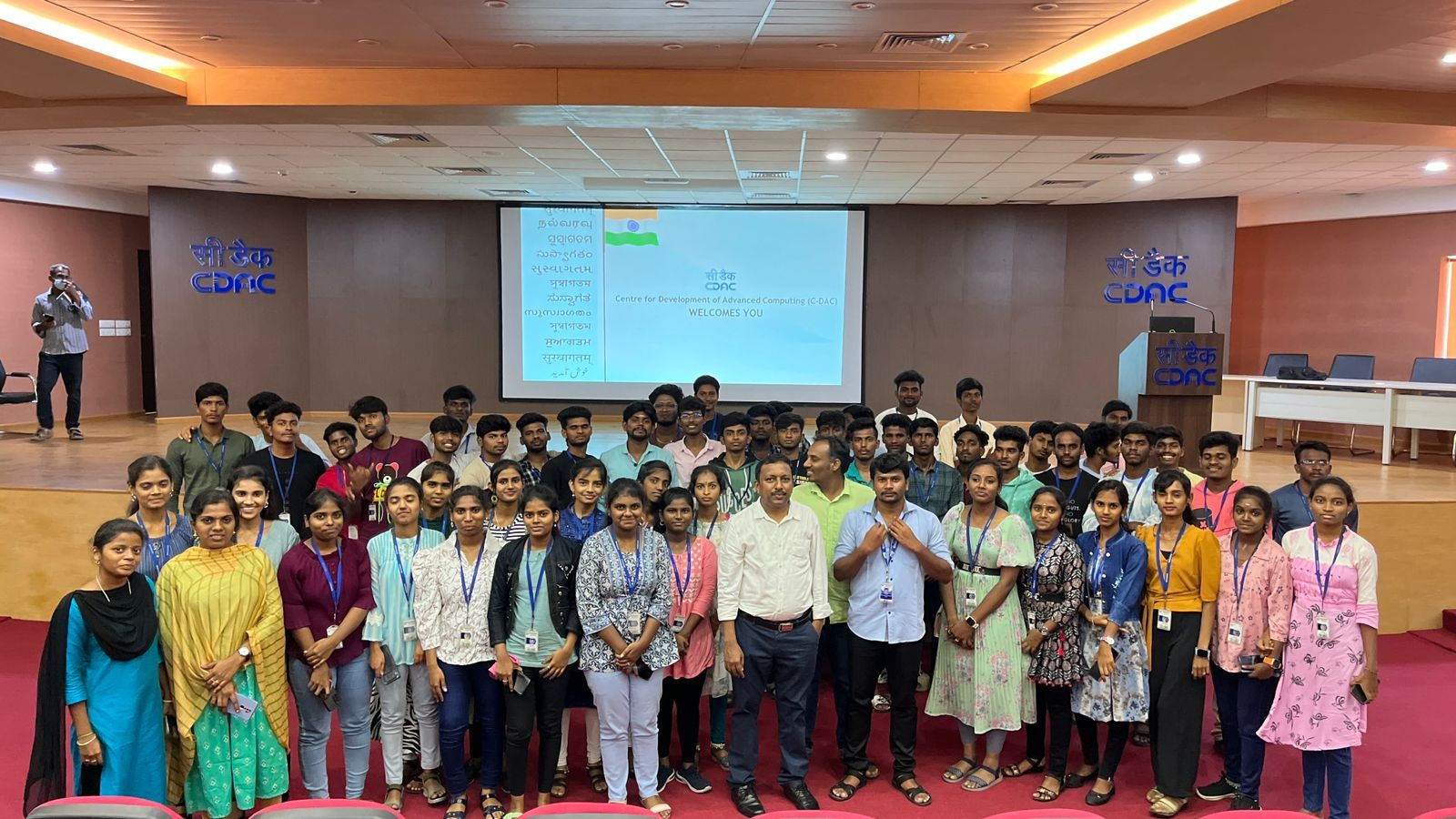
SMEC Technologies, Info park Campus, Kochi, Kerala.
